- Home
- James A. Michener
Rascals in Paradise Page 2
Rascals in Paradise Read online
Page 2
But in the 1820’s the great whalers were from New England, and it was among this group of hardened, able men that Sam Comstock took his place on December 15, 1822, when the whale ship Globe set forth on what its crew knew would be a long and possibly dangerous voyage.
The Globe did not actually sail from Nantucket, for a sand bar had begun to impair that harbor and large vessels had formed the habit of using alternate ports. The Globe, for example, sailed that day from Edgartown, on Captain Thomas Worth’s native island of Martha’s Vineyard.
As the whaler stood out to sea, Sam Comstock, the chief harpooner and boat steerer, had his first chance to see the four officers whom he would have to murder before he could commandeer the famous ship.
Captain Worth was a competent, salty seafarer with two weaknesses. He was apt to sign men on in a hurry and then to discipline them sharply if they turned out to have been poor choices.
First Mate William Beetle was well versed in whaling life and a good officer, but his men accused him of one fatal weakness: he gossiped about them.
Second Mate John Lumbard was as brave a man as any who ever sailed the Pacific. He was a big man, and to him fell the job of administering such lashes as his captain ordered. For this the men hated him.
Third Mate Nathaniel Fisher was a tremendously strong man well trained in wrestling, a skill that was to call forth Sam Comstock’s mad mutiny.
Harpooner Comstock, as he surveyed his future victims, was an inconspicuous, thin-faced, tense young man with the wiry arms needed to plunge the harpoon home and the piercing eyes required for boat steering.
This job of boat steering required exquisite skill. Even before the small whaleboat was launched, Comstock had to coil the harpoon line properly in the tub which stood at his boat’s prow—a task which might take several hours, for one kink could be fatal. This line was about two hundred fathoms long. If the chase of a harpooned whale developed into heroic proportions, the lines from six different boats would be joined, and the agonized whale might sound nearly a mile in the distance; but always when he surfaced there would be that gadfly harpoon in his side and that small boat trailing more than a mile astern.
It was also the boat steerer whose steady arm and keen eye probed for the vital spot when the whale was about to be harpooned. It was his savage strength that drove the rapier-like weapon home. And when the whale was safely harpooned, it was the boat steerer’s job then to switch places with the mate at the steering oar and guide the boat until the great beast was lanced to death.
The boat steerer was an important person and as such he bunked with the officers and, along with the first mate, headed a watch. In Sam Comstock’s case he was particularly important, because the Globe also carried Sam’s junior brother, George, who at sixteen was making his first whaling voyage. He idolized Sam and enjoyed watching his important older brother swank and swagger among the crew.
The cruise began with bad luck. On the very first day out, the crossjack yard carried away in a high wind, and as if loath to proceed toward its fearful destiny, the Globe limped back to port and refitted. Then another omen delayed them—head winds rose and pinned them down inside the breakers for several days.
Finally, when the ship was well at sea, a furious winter gale struck and rolled the Globe on its side, so that even the least superstitious seaman could have been forgiven had he turned back from a voyage that had started so unpropitiously.
Bad luck dogged the ship right through the Atlantic, for by the time Captain Worth took his crew around Cape Horn they had bagged only one whale. Far into the Pacific they were still without whales when an excited lookout shouted that a whole fleet of the monsters lay dead ahead. Unfortunately the sea beasts turned out to be only a group of native canoes from Hawaii whose owners wanted to trade yams and coconuts for nails or old hoop iron.
Finally good times arrived. Off Japan the lookout again shouted, “Thar she blows!” and this time he was right. Within a few months Sam Comstock led his boat to numerous kills and the Globe began to ride lower in the sea, burdened with 550 barrels of oil.
In celebration of their growing wealth, the officers of the Globe hailed a passing Nantucket whaler and the two ships declared holiday and joined in a day’s festivities, the highlight of which was a furious wrestling match between wiry Sam Comstock and big Third Mate Nathaniel Fisher. Cocky Sam had issued the challenge, and for a few minutes, on the slippery deck, Sam held his own, but then Fisher’s superior size and skill told, and he threw the harpooner firmly to the boards.
Comstock in a blind rage leaped to his feet, swung wildly, recovered, and slugged the officer savagely in the face. Here was occasion for Fisher to reprimand Comstock formally and to punish him according to the accepted rules of the sea, but this was a day of relaxation and fun, so huge Fisher grabbed the wildly swinging harpooner, lifted him high in the air and slammed him onto the deck.
Sam came back trembling with rage to assault the officer. Again Fisher hoisted him into the air and smashed him on the boards.
Stunned, Sam shook the fuzziness from his red brain, then lurched back to strike Fisher once more. This time the patient officer picked Sam up quickly, twisted him for a better grip, and flung him well away.
Sam lay dazed, then stared at Fisher and croaked in an awful voice, “I’ll have your heart’s blood for this, Fisher!”
The big officer looked down at the harpooner and laughed.
“His blood,” Sam muttered. “I’ll have his heart’s blood.”
It was about this time that Captain Worth decided his crew needed fresh food and shore leave. Accordingly he turned away from the “off Japan” grounds and headed back for one of the wildest and loveliest ports that ever flourished in the Pacific; and with every eastward league, the spirits of the crew rose.
For Honolulu, in 1823, was a whaler’s paradise. The Hawaiian Islands had the only good ports within a radius of two thousand miles, and in the 1820’s about a hundred whale ships called each year at Honolulu. The town lay at the foot of beautiful hills which discharged volumes of good water. Cattle from island ranches were slaughtered for fresh meat. Forests were denuded for galley firewood. Whaling captains spent thousands of dollars a year for fresh vegetables, sugar, molasses, coffee, bananas, coconuts, breadfruit, melons, pineapples, turkeys, hogs and goats.
A shipyard had just been opened, run by two survivors of the wreck of an English whale ship on a reef in the Hawaiian chain. Spare canvas and spars to replace fittings torn away by tropical storms could be obtained. The ship chandlers of Honolulu also offered for sale the hundreds of items needed to equip a seaworn whaler, including pitch, calking, marlinspikes and supple hemp line for harpooners. Here mail could be picked up in shipping offices where it was held for wandering seamen, and many a sailor rushed ashore at Honolulu to discover that far away in Nantucket he had become a father.
But it was not fresh fruit, or new canvas, or letters from home that tantalized the spirits of Pacific whalemen when word sped through their ships that the next port of call was Honolulu. It was the women and rum.
The women were special, and one of the chief reasons why young fellows like Sam Comstock dreamed of escaping from the rigors of New England was that returning sailors boasted along the Massachusetts coast of the wild and strange times they had enjoyed with the sunburned women of Hawaii.
There were all kinds of women. There were plump Samoan girls who had come thousands of miles north as playmates aboard wandering ships that had touched their islands. There were lovely Tahitian girls who might have crisscrossed the ocean many times. There were some girls from Boston who had broken away from the puritanical groups with which they had come to the islands, and there were the usual roving lights-of-love of German, Scandinavian and British origin.
Rum flowed freely in the low-roofed grogshops and dance halls scattered along the water front. Loafing in these dens or dozing outside under palm trees were at least a hundred beachcombers who had deserted from their ships an
d were in no hurry to sign on again in the stinking forecastle of a “blubber hunter.”
Law and order were not conspicuous in the Polynesian kingdom of Hawaii at the time the Globe returned from her western cruise. The young king, Kamehameha II, had just left for a tour of England and America, to talk things over with King George and other fellow monarchs. Far off in London, he and his favorite queen were to die of that horrible foreign disease, the measles. The dowager queen, left behind as regent, could not control the water front. Law enforcement problems are suggested in a surviving schedule of “Fines for Malconduct of Seamen,” which included penalties ranging all the way from hanging (for maliciously violating the laws controlling contagious diseases) down through $30 for adultery, $6 for desecrating the Sabbath, $5 for headlong horseback riding, and $1 for hallooing in the streets at night.
In fact, Honolulu was such an alluring port that many strong-minded captains refused to touch there, for desertions of nearly half a ship’s complement were not uncommon. In time the problem became so acute that ship owners banded together and paid head money to native gangs for each deserter hauled in from the hills or lush valleys, but some wise Yankee skippers avoided the whole problem by cruising back and forth in sight of land and sending ashore only longboats manned by trusted officers, who accumulated the required provisions and rowed back to their reluctant ships. Occasionally, of course, even such special crews deserted.
Captain Worth of the Globe followed neither of these desperate alternatives, but it might have been better if he had. He could not avoid Honolulu altogether, because he needed provisions. And once in sight of land it was difficult to refuse shore leave, because the Globe was a favorite ship in this port. On a preceding voyage under another captain, while she was anchored in Honolulu harbor, a dangerous fire had broken out in the town and swept down upon the royal fort, which contained a thousand casks of black gunpowder. Only prompt action by the Globe’s crew, acting as a bucket brigade, prevented a holocaust that would have destroyed the mushrooming port.
Therefore on this visit late in 1823 the Globe’s crew were treated as heroes and six men promptly deserted. Four were never heard of again and pass from history to some quiet native village or other where they stayed with the languorous beauties who had bewitched them. The other two were tracked down by Captain Worth and were slapped in chains and stowed below decks; but the lure of Honolulu was so great that one of them, by sheer strength, tore himself free of the chains and set his companion loose, whereupon they too disappeared forever.
Captain Worth was thus left short-handed and through either cajolery or crimps lined up seven newcomers. Obviously the quality of sailor available in Honolulu at this time was not very attractive, but the seven monsters that Captain Worth dredged out of the grogshops, the houses of ill repute and the palm-frond shacks were almost unbelievably evil. Three of them played only minor roles in what was to follow—that is, none killed more than one friend and that in no unusual or spectacular manner—but four of them passed from the dives of Honolulu into the history of the Pacific. Lazy and sullen, they caused mischief from the start, and furnished tinder for the fiery soul of Sam Comstock.
We can imagine these four worthies mustering in bright sunlight on their first sober day at sea after the Globe cleared Honolulu on December 29, 1823. Tall, unshaven, surly and rugged, Silas Payne of Sag Harbor, Long Island, was clearly a leader. No one knew how he had come to Honolulu or what had beached him. He seemed able and proved himself a first-class seaman, but he hated officers and early in his stay aboard caused minor trouble.
John Oliver was a stocky Englishman, a sailor who had knocked about the merchant fleets of the world and who seemed destined to continue doing so. He was uncommunicative, a very good man in a fight, and one willing to consider anything, even mutiny.
William Humphries was a rangy Negro from Philadelphia. He said he was a steward but showed little aptitude for that work. Probably because he had usually been distrusted by white shipmates, he in turn distrusted them.
The last member of the foursome was something special, a man who, everyone agreed, was destined for hanging. Joseph Thomas, from Connecticut, knew a hundred ways to irritate ship captains. The trick that irked Captain Worth most was Thomas’ habit of dawdling at meals and then rising in a surly manner just as the captain’s patience seemed about to break. Thomas quickly sensed that this was driving the skipper crazy and perfected his insolence.
Trouble erupted on the morning of Sunday, January 25, 1824, near Fanning Island, far south of Honolulu, when Second Mate Lumbard summoned the men. Thomas snarled, “I’m still eatin’ me breakfast!” This was more than Captain Worth could stand. Banging on the scuttle, he ordered Thomas to come above. At this Thomas ambled slowly on deck and started to argue.
Captain Worth well knew what happened at sea when insolence went unrestrained. “I’ll have you whipped for that!” he rapped out.
“It’ll be a dear blow for you if you do!” Thomas threatened.
That was enough. Captain Worth grabbed Thomas by the collar. The three mates were ordered to summon the crew aft to witness punishment. Taking the rope in his own hands, Captain Worth personally beat the sailor.
The buntline fell again and again. Soon Thomas was bleeding and limp while the sodden blows of the lash cut into his flesh. Grimly the officers watched the faces of the crew.
Sam Comstock—half officer, half forecastle hand—also studied his mates. Some, like his brother George, were visibly terrified by the thin red spouts of blood that leaped from the back of their fellow seaman. Others, like surly Silas Payne, stared sullenly at the brutal scene and recalled times past when it was they who had been lashed till the blood came.
Apparently it was at this instant, during the flogging of Joseph Thomas, that harpooner Comstock made his decision. From later evidence it seems that this was the time he first proposed to Payne and to Oliver, the willing Englishman, that when the Globe reached Fanning Island, those three plus as many others as wished would simply make a break for it. Here Sam would establish his kingdom.
A more unlikely spot for an island paradise than this footprint-shaped atoll could not have been found: knife-sharp coral reef, swampy lagoon, inadequate food and unattractive natives. But Sam was determined.
His next job was to sound out other members of the crew, and when he did, he found that all the seven beachcombers taken aboard at Honolulu were willing to jump ship at Fanning. Toward noonday he edged up to a young boy of seventeen or eighteen who was musing at the maintop masthead. He was an attractive-looking youngster, bright and a willing worker, and during the long voyage he had given some signs of admiring the harpooner.
“What shall we do, Will Lay?” Comstock whispered.
“What do you mean?” the boy asked through suddenly dry lips.
“We’ve had bad usage, Will! Which shall we do? Run away or take the ship?”
Will Lay, on his first voyage and sickened by what he had seen that day, mumbled something incoherent and turned aside.
From that moment he was a marked man. Later in the day he heard that Sam and Payne had made up their minds. It was to be desertion when they were abreast of Fanning. Twice Lay attempted to get word of this plot to the officers, but Comstock kept close watch on him. Toward dusk Lay was helping furl the mainsail under Second Mate Lumbard’s supervision, but whenever he had a chance to warn the mate, either Sam Comstock or menacing Silas Payne would loom up beside him with a threatening look.
“At midnight!” ran the whisper from one member of the gang to another. At midnight they would jump ship.
In many respects the mutiny of the Globe is one of the strangest in seafaring annals, and one of the weirdest aspects is the role played by the whaling ship Lyra. On this fateful Sunday the Lyra, Captain Joy commanding, was sailing in company with the Globe, and in the late afternoon, while the mutiny was being planned in the most casual and careless way, Captain Joy and a contingent from the Lyra rowed across the peacef
ul sea to visit with the officers of the Globe. Crew members intermingled freely, and when the Lyra men rowed back in the early evening it was agreed by the captains that the two whalers would sail together through the night and that the Globe would hoist a lantern toward midnight, whereupon the ships would simultaneously shift to a new tack.
Therefore, during all the events that were to follow that night, a full-rigged consort ship, in complete control of its officers, would be riding with full lights only a few hundred yards away. That no sound of the Globe mutiny and no indication of its progress ever reached the Lyra is merely another of the sea’s many mysteries. But that Sam Comstock would embark upon his great adventure within hailing distance of a fully armed ship is almost incredible.
At ten o’clock that Sunday night Sam Comstock relieved the deck watch and found that his younger brother George was at the helm. “Keep her a good full,” Sam ordered. Sometime in the next hour or two the harpooner changed his mind. He would not jump ship at Fanning. Since he was in command of the deck, he would take the ship, murder the officers, desert the Lyra and speed away to a better island. He reported these new plans to his fellow conspirators, and they agreed.
At midnight sharp, young George Comstock lifted the rattle by which the steersman traditionally summoned his replacement. He fell back in terror when his brother Sam appeared in the darkness, grabbed the rattle, and rasped: “If you make the least damned bit of noise, I’ll send you to hell!”
By the pale light of the binnacle, frightened George saw under his brother’s arm a boarding knife—two-edged, four feet long, used for stripping blubber. Then Sam lighted a lamp, shifted the boarding knife to his right hand, and started to go below, where the officers’ cabins lay.
More alarmed than ever, George again grabbed for the rattle. But again Sam was at his side, chilling his blood with threats so diabolical that the boy realized he would be killed if he tried to warn the unconscious victims below.

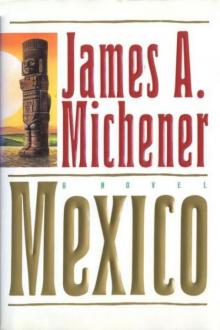 Mexico
Mexico The World Is My Home: A Memoir
The World Is My Home: A Memoir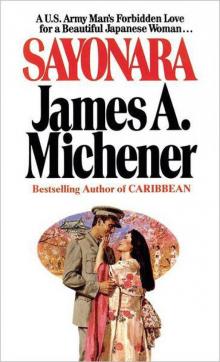 Sayonara
Sayonara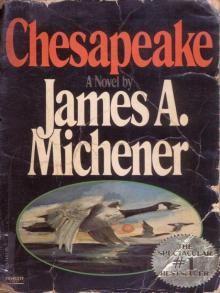 Chesapeake
Chesapeake The Novel
The Novel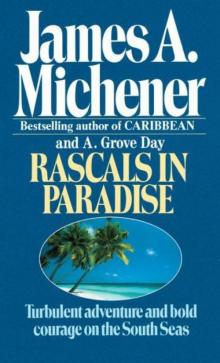 Rascals in Paradise
Rascals in Paradise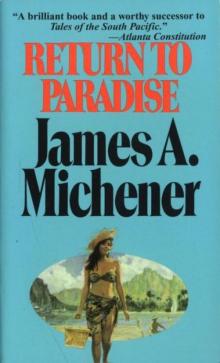 Return to Paradise
Return to Paradise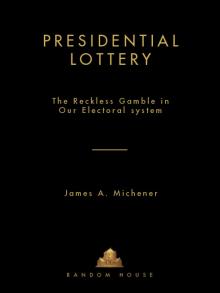 Presidential Lottery: The Reckless Gamble in Our Electoral System
Presidential Lottery: The Reckless Gamble in Our Electoral System The Source
The Source Poland
Poland Space
Space Caravans
Caravans Creatures of the Kingdom: Stories of Animals and Nature
Creatures of the Kingdom: Stories of Animals and Nature Iberia
Iberia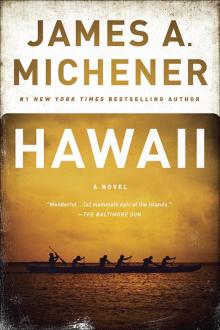 Hawaii
Hawaii The Watermen: Selections From Chesapeake
The Watermen: Selections From Chesapeake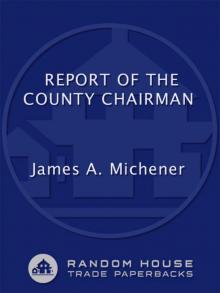 Report of the County Chairman
Report of the County Chairman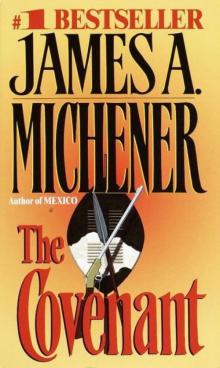 The Covenant
The Covenant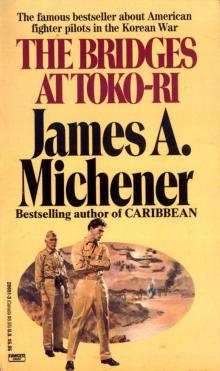 The Bridges at Toko-ri
The Bridges at Toko-ri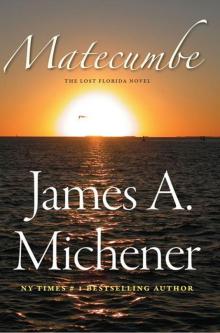 Matecumbe
Matecumbe Journey: A Novel
Journey: A Novel Centennial
Centennial Sports in America
Sports in America Texas
Texas Miracle in Seville
Miracle in Seville This Noble Land: My Vision for America
This Noble Land: My Vision for America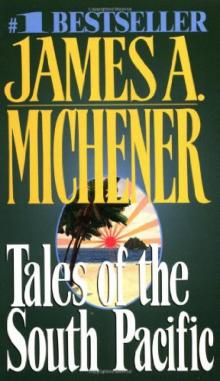 Tales of the South Pacific
Tales of the South Pacific Bridges at Toko-Ri
Bridges at Toko-Ri Space: A Novel
Space: A Novel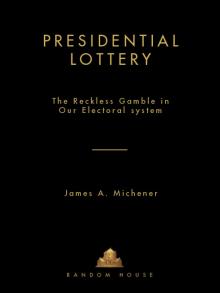 Presidential Lottery
Presidential Lottery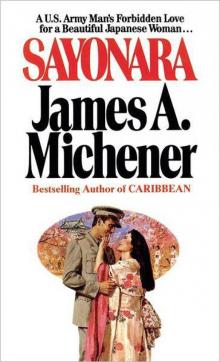 Sayonara: A Novel
Sayonara: A Novel This Noble Land
This Noble Land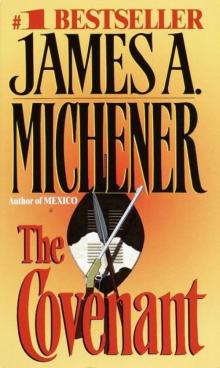 The Covenant: A Novel
The Covenant: A Novel Miracle in Seville: A Novel
Miracle in Seville: A Novel The Bridge at Andau
The Bridge at Andau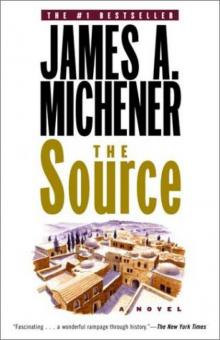 Source
Source The Source: A Novel
The Source: A Novel Journey
Journey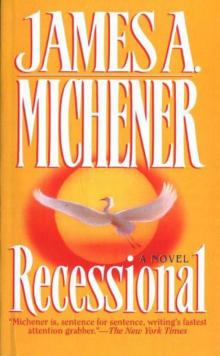 Recessional: A Novel
Recessional: A Novel Legacy: A Novel
Legacy: A Novel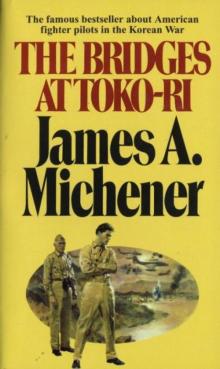 The Bridges at Toko-Ri: A Novel
The Bridges at Toko-Ri: A Novel Poland: A Novel
Poland: A Novel